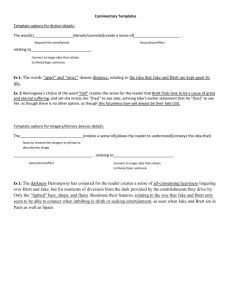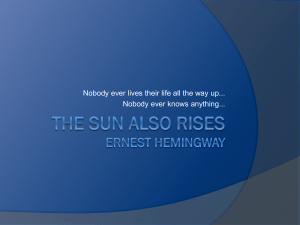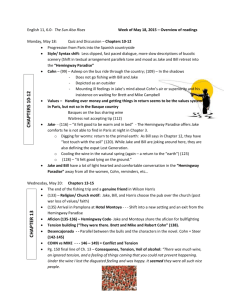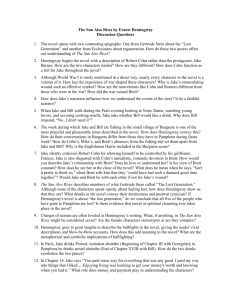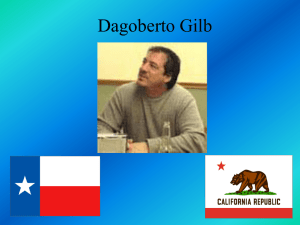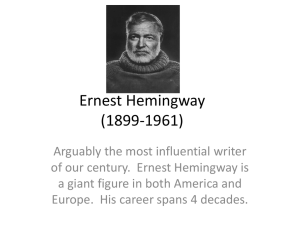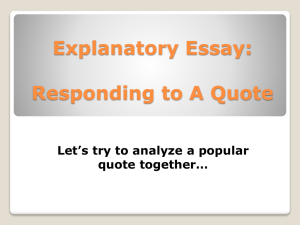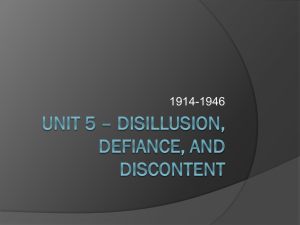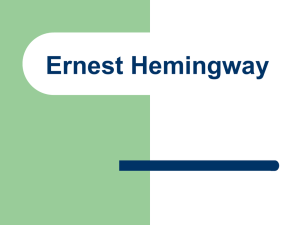Elaboration and Quote Weaving Review
advertisement
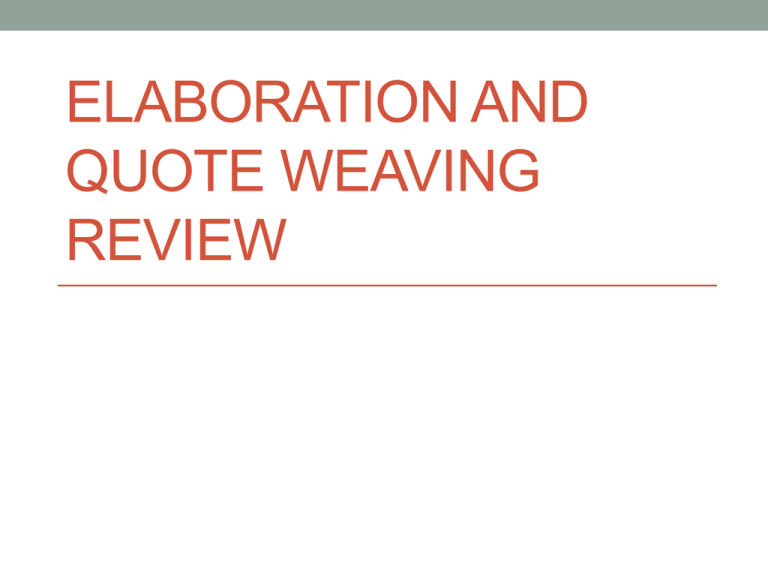
ELABORATION AND QUOTE WEAVING REVIEW Choosing Detail • Original: The narrator says,“Then we crossed a wide plain, and there was a big river off on the right shining in the sun from between the line of trees, and way off you could see the plateau of Pamplona rising out of the plain…” (Hemingway 98). • Improved: As Jake travels across the countryside of Spain, he describes the river “shining in the sun” and the “plateau of Pamplona rising out of the plain…” (Hemingway 98). • Both of the quoted pieces contain powerful imagery and alliteration, which is best quoted directly. The rest of it could be paraphrased. Analysis and Quote Weaving Rules • All analysis of fiction should be in present tense, third person. • All quotes should be in present tense, third person, even if that is not what the original text is in. • Exceptions: if the what is being referred to is past in the present of the story. For example: The boy announces to his class that “Hitler was a bad guy” (34). Quote Weaving Your quote should always be woven into a sentence: Woven Quote: As Jake travels across the countryside of Spain, he describes the river “shining in the sun” and the “plateau of Pamplona rising out of the plain…” (Hemingway 98). • Notice how spoken aloud, the quote sounds like a complete sentence. Some strategies for this is starting the quote with a verb or noun, so you can integrate it into your sentence. Quote Weaving • Changed POV: Bill claims “I know who they are” (Hemingway 78). • 3rd person consistency: Bill claims that he “know[s] who they are” (Hemingway 78). • Changed tense: Jake and Bill reach Spain and “passed through a town” before “the road commenced to mount” (78). • Present tense consistency: Jake and Bill reach Spain and “[pass] through a town” before “the road [commences] to mount” (78). Parenthetical Citation • Cite your quote at the end of the sentence containing the quote. • The author’s name and the pg. # go in parentheses after the closing quotation mark. • The period goes after the closing parentheses. Ex: Bill claims that he “know[s] who they are” (Hemingway 78). • After the first time you mention the author’s name your writing, you don’t have to include it in your citations. Ex: In The Sun Also Rises by Ernest Hemingway the theme is the idea that…. Bill claims that he “know[s] who they are” (78). Parenthetical Citation • If you don’t have the citation after a quote, the punctuation mark will go inside the quotation. Jake and Bill watch the “grain-fields,” and as they climb higher, notice the “wind blowing the grain,” their attention captivated by the Spanish countryside (111). Elaboration • Elaboration for direct quotes should be factual. • You should address the following topics when creating elaboration: 1. Placement of the D and what happened leading up to it. 2. Context of the D being used; what is happening at the time? 3. Devices being used in the D 4. Paraphrasing the D if the quote is hard to understand by itself. Elaboration • As Jake travels across the countryside of Spain, he describes the river “shining in the sun” and the “plateau of Pamplona rising out of the plain…” (99). • E-placement: Towards the middle of the book. • E-context: Jake is traveling to Pamplona with Robert Cohn and Bill after being in bustling, urban Paris. • E-device: imagery and alliteration Detail/Elaboration • Towards the middle of the book, Jake travels with Robert Cohn and Bill across the countryside of Spain, away from bustling, urban Paris. He employs imagery and alliteration to describe the river “shining in the sun” and the “plateau of Pamplona rising out of the plain…” (99). • Placement in the book? • Where exactly are they? • Where have they just come from? • Who is involved? In The Sun Also Rises, Ernest Hemingway’s diction addresses the fear of being inferior to others. At the beginning of Book II, Jake met up with his friend, Bill Gorton. Bill was already inebriated and urged Jake that you should not be “daunt[ed]” and join him in drinking (79). The word, “daunt” gained significance as Bill continued to use it, insisting he had “never been daunted in public” and speaking of a friend who reached success by never being “daunt[ed]” (79). This word connotes weakness, and as Bill was only concerned about appearing this way in public, the reader can sense that he only feared others perceiving him as weak and therefore inferior. The repetition of “daunt” emphasized Bill’s insecurity at the mere idea of seeming less-than, which is an emotion that continues to reappear in the book’s “lost” characters.

